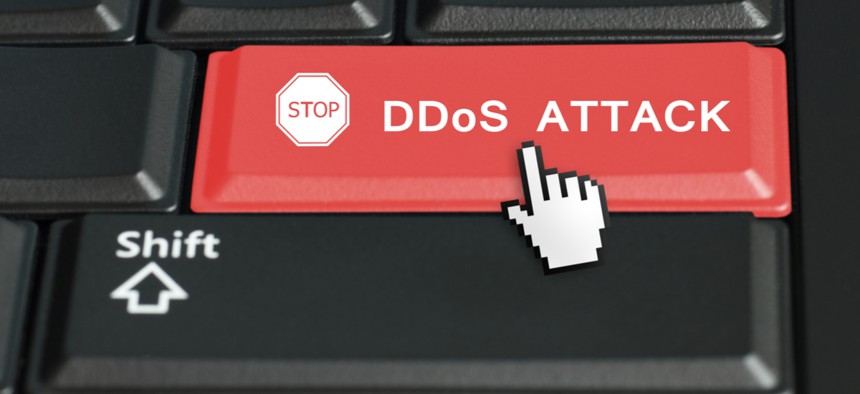GAO Probing FCC Claims of Denial-of-Service Attack

DD Images/Shutterstock.com
Critics have questioned whether the FCC’s commenting site was actually hit with a distributed denial-of-service attack or just deluged with comments opposing net neutrality repeal.
The government’s top auditor is investigating the Federal Communications Commission’s claim that its commenting system suffered a distributed denial-of-service attack during a controversial debate over repealing net neutrality rules in May 2017, a spokesman told Nextgov Wednesday.
The alleged DDoS attack, which slowed but did not completely disable the commenting site, came after comedian John Oliver urged his viewers to submit comments opposing the net neutrality rewrite favored by the Trump administration. Those new rules, which are favored by internet service providers, will take effect next week.
The timing has led some critics to suggest the massive increase in traffic to the FCC commenting site may have come from citizens with legitimate concerns about the policy change rather than from automated computer bots.
The FCC has not released data to support its claim that the system was hit by a DDoS attack and declined to provide that information to Nextgov Wednesday.
The Government Accountability Office previously said it would investigate the alleged DDoS attack this spring. GAO doesn’t have a projected date yet for when the investigation will be complete or when a report will be issued, spokesman Chuck Young said.
Interest in the dispute renewed Tuesday when Gizmodo published a trove of emails in which David Bray, the FCC chief information officer at the time, urged news organizations in off-the-record conversations to describe the site slowdown as a DDoS and to compare it to an earlier DDoS against the Pokémon Go mobile game. The emails were provided by the watchdog group American Oversight, which obtained them through a Freedom of Information Act request.
Nextgov was among the news outlets that corresponded with Bray and covered the slowdown.
The former CIO told some outlets that a separate 2014 commenting site outage was also caused by a DDoS attack, but that the commission never released that fact out of fear of copycat attacks. That outage also occurred during a net neutrality review after Oliver had urged fans to comment.
No media reported the claim at the time.
Bray responded to the Gizmodo article in a Medium post Tuesday in which he stepped back from the specific phrase “distributed denial of service attack” but insisted that the commenting site was, indeed, under digital assault.
“Whether the correct phrase is denial of service or ‘bot swarm’ or ‘something hammering the Application Programming Interface’ (API) of the commenting system—the fact is something odd was happening in May 2017,” Bray wrote.
He went on to describe a situation on May 8 in which the commenting site’s API was receiving a volume of digital requests that far outpaced the number of comments that were actually being filed.
Bray determined that disparity was likely caused by a digital attack based on the evidence at hand, he said, but was primarily focused on keeping the site up and running for legitimate commenters.
The FCC released a statement claiming a DDoS the same day.
An API is a digital tool that allows one website to link to another to conduct specific tasks. For example, pro- and anti-net neutrality groups might have used the FCC API to allow visitors to their own sites to leave comments without going directly to the FCC site.
It’s not abnormal for API requests to not track perfectly with comments, but a massive disparity would be abnormal. According to Bray, the FCC site was receiving 35,000 API requests per minute at one point compared with 90,000 total comments during the first half of that day.
The FCC described a similar chain of events in a June 2017 correspondence with Sens. Ron Wyden, D-Ore., and Brian Schatz, D-Hawaii. In that letter, the commission said the event was “best classified as a non-traditional DDoS attack.”
FCC consulted with the FBI about the event, according to the letter to the senators, but “the conclusion was reached that, given the facts currently known, the attack did not appear to rise to the level of a major incident that would trigger further FBI involvement.”
The commission declined to comment Wednesday on whether it stands by the DDoS claim.
The disparity between API requests and comments is, indeed, one indicator of a DDoS attack, Mark Rasch, a Maryland Attorney focused on privacy and information security who previously worked for the Justice Department and Verizon, told Nextgov.
It’s impossible to determine from information that’s been publicly released, however, whether a DDoS actually occurred, Rasch said.
The traffic surge to the commenting site might have been caused by a traditional DDoS campaign, which relies on digital power from thousands of far-flung computers and devices to overpower a website, he said. It might also have been caused by a campaign that deluged the commenting site with stock comments supporting or opposing the FCC’s net neutrality reforms or with unrelated spam.
Or, the surge could have been caused by legitimate commenters, spurred by Oliver’s campaign, which caused the API-comments disparity for an unknown reason, Rasch said.
The only way to gain certainty would be by thoroughly analyzing the information packets that pinged the site and the API, including where they came from and how they behaved, Rasch said.
The FCC has not released the results of such an investigation, though GAO might.
It’s common for organizations to announce that they’re being DDoSed based on a speedy analysis because they want to explain why their websites or services are down or malfunctioning, Rasch said. A government agency, however, ought to confirm that speedy determination with a more thorough analysis later, he added.
NEXT STORY: Lawmakers seek answers on possible drone threat






